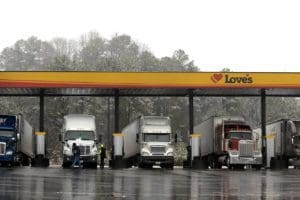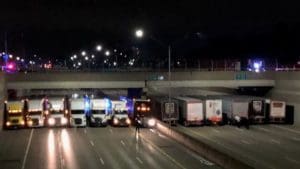 Last month, I mentioned in my news roundup intro that the “Great Pacific Garbage Patch” may be significantly larger than previously thought. It turns out that the plastic waste floating in the Pacific Ocean between California and Hawaii contains at least 79,000 tons of material spread over 1.6 million square kilometers. That’s the equivalent mass of 6500 school buses, and about the size of Mongolia or Iran. And this mass is only a small part of the overall waste that ends up in the world’s oceans. It is estimated that 8 million metric tons of plastic end up in the ocean every year. One small portion of the plastic waste that ends up in oceans every year is from plastic straws, but companies are starting to push back. McDonald’s for instance, announced a switch to paper straws in all of its 1,300 UK locations starting in May. Chains such as Wagamama and Pizza Express are also moving away from plastic straws. In the US, many cities have begun to ban plastic straws. And while they only make up a tiny portion of the world’s plastic pollution, they seem to be an easy way to get consumers thinking about the bigger picture. And now on to this week’s logistics news.
Last month, I mentioned in my news roundup intro that the “Great Pacific Garbage Patch” may be significantly larger than previously thought. It turns out that the plastic waste floating in the Pacific Ocean between California and Hawaii contains at least 79,000 tons of material spread over 1.6 million square kilometers. That’s the equivalent mass of 6500 school buses, and about the size of Mongolia or Iran. And this mass is only a small part of the overall waste that ends up in the world’s oceans. It is estimated that 8 million metric tons of plastic end up in the ocean every year. One small portion of the plastic waste that ends up in oceans every year is from plastic straws, but companies are starting to push back. McDonald’s for instance, announced a switch to paper straws in all of its 1,300 UK locations starting in May. Chains such as Wagamama and Pizza Express are also moving away from plastic straws. In the US, many cities have begun to ban plastic straws. And while they only make up a tiny portion of the world’s plastic pollution, they seem to be an easy way to get consumers thinking about the bigger picture. And now on to this week’s logistics news.
- Amazon to roll out package delivery to cars
- DoorDash tests grocery delivery with Walmart
- Deliv now offers same-day service for Shopify customers
- Uber Freight not looking to undercut brokers
- US warehouse and distribution rents rise
- Project44 raises $35m in funding
- Truckers line up under Michigan overpass to prevent suicide
![]() Stories have been popping up lately about package thieves stealing items from people’s porches and front steps. In fact, the problem has gotten so bad that there are entire YouTube channels devoted to would-be package thieves getting their comeuppance. Well, Amazon is not satisfied with dropping package at customers doors. Earlier this week the company launched a program to deliver packages to customers’ parked cars. Amazon is rolling the program out to 37 US cities, where all customers need is a newer, compatible vehicle. Customers can download an app and link it to the vehicle’s connected car service, such as GM’s OnStar system or Volvo’s On Call service. The Amazon delivery service taps into the car’s built-in unlock feature without ever giving the delivery person a pass code or other permanent access to the car.
Stories have been popping up lately about package thieves stealing items from people’s porches and front steps. In fact, the problem has gotten so bad that there are entire YouTube channels devoted to would-be package thieves getting their comeuppance. Well, Amazon is not satisfied with dropping package at customers doors. Earlier this week the company launched a program to deliver packages to customers’ parked cars. Amazon is rolling the program out to 37 US cities, where all customers need is a newer, compatible vehicle. Customers can download an app and link it to the vehicle’s connected car service, such as GM’s OnStar system or Volvo’s On Call service. The Amazon delivery service taps into the car’s built-in unlock feature without ever giving the delivery person a pass code or other permanent access to the car.
![]() DoorDash has been in discussions with Postmates for a merger, which recently partnered with Walmart to expand the company’s grocery delivery business. While nothing has come out of the merger discussions yet, DoorDash is testing grocery delivery for Walmart as well. Doordash recently received $535 million in funding from investors, led by SoftBank Group. The new service, which is only available in Atlanta to start, charges customers a $9.95 delivery fee on each order of at least $30 worth of goods. Customers can receive their purchases on the same day they order. With the grocery delivery market booming, it is not surprising to see an influx of cash from investors. DoorDash is now valued at $1.4 billion.
DoorDash has been in discussions with Postmates for a merger, which recently partnered with Walmart to expand the company’s grocery delivery business. While nothing has come out of the merger discussions yet, DoorDash is testing grocery delivery for Walmart as well. Doordash recently received $535 million in funding from investors, led by SoftBank Group. The new service, which is only available in Atlanta to start, charges customers a $9.95 delivery fee on each order of at least $30 worth of goods. Customers can receive their purchases on the same day they order. With the grocery delivery market booming, it is not surprising to see an influx of cash from investors. DoorDash is now valued at $1.4 billion.
 Crowdsourced delivery startup Deliv has been making waves recently as well, as it adds more retailers to its roster. The company has now partnered with Canadian e-commerce platform Shopify to offer same-day delivery to Shopify’s retailer’s customers. The new partnership is reliant upon Zapiet, a store pickup and local delivery plug-in for Shopify, which allows retailers to manage store inventories and configure the confines of the deliveries. Across all of its 35 markets, Deliv has a network of tens of thousands of delivery drivers on board.
Crowdsourced delivery startup Deliv has been making waves recently as well, as it adds more retailers to its roster. The company has now partnered with Canadian e-commerce platform Shopify to offer same-day delivery to Shopify’s retailer’s customers. The new partnership is reliant upon Zapiet, a store pickup and local delivery plug-in for Shopify, which allows retailers to manage store inventories and configure the confines of the deliveries. Across all of its 35 markets, Deliv has a network of tens of thousands of delivery drivers on board.
 The “Uberization of freight” has been a hot topic lately, especially with the driver shortage and capacity crunch hitting the shipping industry. One big thought was that Uber would step in and undercut the competition, relying on volume versus margins. Well, according to Uber Freight’s head, the company is pricing its broker services competitively and is not looking to undercut other brokers. Considering how competitive pricing in the broker market is, it is not surprising to see Uber take this route. Uber Freight is also trying to ditch the image of simply being a “load matching service.” Instead, the company is looking to innovate with programs such as “Take Me Home” designed to help drivers find loads that return them to their home bases.
The “Uberization of freight” has been a hot topic lately, especially with the driver shortage and capacity crunch hitting the shipping industry. One big thought was that Uber would step in and undercut the competition, relying on volume versus margins. Well, according to Uber Freight’s head, the company is pricing its broker services competitively and is not looking to undercut other brokers. Considering how competitive pricing in the broker market is, it is not surprising to see Uber take this route. Uber Freight is also trying to ditch the image of simply being a “load matching service.” Instead, the company is looking to innovate with programs such as “Take Me Home” designed to help drivers find loads that return them to their home bases.
The e-commerce boom is making an impact far beyond the last mile arena; warehouse and distribution rents are on the rise. According to the Journal of Commerce, US shippers are having a harder time finding warehouse and distribution space as US industrial real estate rates dipped 0.1 percentage points to 5 percent in the first quarter, compared to 2017. Average rents have also risen 5.4 percent in that same time period. With vacancy rates at historic lows, rental prices will continue to climb, with rates rising in 59 of 79 markets tracked.
 Money is pouring into the transportation execution and visibility space, with a lot of attention being paid to the visibility market. To that end, logistics technology provider project44 has raised $35 million in venture-capital funding to expand beyond its North American base. Project44 is a logistics service provider that enables visibility across the entire shipment workflow. By connecting with multimodal transportation providers, project44 delivers data to customers to give them more control over the entire shipping lifecycle. The latest round of funding places project44’s value at over $100 million.
Money is pouring into the transportation execution and visibility space, with a lot of attention being paid to the visibility market. To that end, logistics technology provider project44 has raised $35 million in venture-capital funding to expand beyond its North American base. Project44 is a logistics service provider that enables visibility across the entire shipment workflow. By connecting with multimodal transportation providers, project44 delivers data to customers to give them more control over the entire shipping lifecycle. The latest round of funding places project44’s value at over $100 million.
 And finally, sometimes we all need a feel-good story. Depression and suicide are certainly nothing to be taken lightly. But truckers in Metro Detroit answered the call to help a troubled man earlier this week. Police received calls about an individual on an overpass and officers responded and found a male on the outside fencing. Officers closed the freeway in both directions but pulled the trucks out of traffic and waved them through. The truckers were instructed to line up under the overpass, with the intent to reduce the length of the man’s fall if he jumped. While officers were able to talk the man down, had he jumped or fallen, the convoy would have reduced his fall to about 5 feet, rather than 14-16 feet onto the cement below.
And finally, sometimes we all need a feel-good story. Depression and suicide are certainly nothing to be taken lightly. But truckers in Metro Detroit answered the call to help a troubled man earlier this week. Police received calls about an individual on an overpass and officers responded and found a male on the outside fencing. Officers closed the freeway in both directions but pulled the trucks out of traffic and waved them through. The truckers were instructed to line up under the overpass, with the intent to reduce the length of the man’s fall if he jumped. While officers were able to talk the man down, had he jumped or fallen, the convoy would have reduced his fall to about 5 feet, rather than 14-16 feet onto the cement below.
That’s all for this week. Enjoy the weekend and the song of the week, Pollution by Bo Diddley.

















Leave a Reply